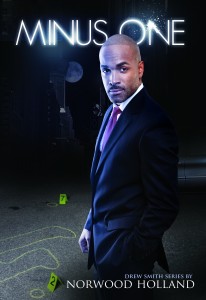A Review of Strangers in the Streets by Mitch Credle
December 29, 2011
Credle takes the writer’s adage “write what you know” to heart, leading the reader on a journey into the heads and hearts of vulnerable young men born into an environment where they are groomed and nurtured in the street life. Love plays a pivotal role and a redeeming force in both their lives. A determined father succeeds in removing Smokey from the ghetto life while Black hardened by time served returns to his uncle’s drug dealing enterprise. He resumes the street life killing and robbing until he falls in love with April, a good woman. Love gives Black’s life purpose but at this point it’s too late. The master of his fate not even April’s nor Smokey’s brotherly love can save him.
Strangers in the Streets is a good read despite eschewing the standard dialog format it nevertheless flows. Few writers are able to capture the depth, breadth and reality of street life as experienced by the young African American male with its distinct language and code of conduct. Mitch Credle does it well because he’s been there growing up on the streets of D.C. and rising up to a Homicide Detective with the Metropolitan Police Department.
Strangers in the Streets is a suspenseful read with actual empathy for the villain Ricky Walker otherwise known as Black. The book leaves the reader a sense of hope. Indeed, there is hope for the young men imprisoned and those queuing up to take their place. That hope can only be manifested by changing the environmental forces that shape their lives.
It is said, men are the products of their environments, some rise above it, many do not. It’s certain by changing their bleak environment we can raise the hopes of many.
Zora Neale Hurston and Langston Hughes: A Woman Scorned
December 22, 2011
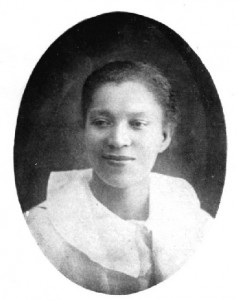 Zora Neale Hurston was in Eatonsville while Fannie Hurst was in Manhattan writing Imitation of Life suggesting there was little if any communication on the project. However that didn’t prevent Sterling Brown and Langston Hughes from accusing Zora of providing the source material.
Zora Neale Hurston was in Eatonsville while Fannie Hurst was in Manhattan writing Imitation of Life suggesting there was little if any communication on the project. However that didn’t prevent Sterling Brown and Langston Hughes from accusing Zora of providing the source material. 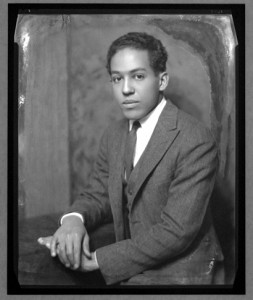 In a note to Fannie, Zora claims that as mistaken as both were she didn’t deny it and took the accusation as the highest of compliments. Sterling Brown wrote a scathing review in Opportunity magazine while the work inspired Langston Hughes spoof Limitation of Life.
In a note to Fannie, Zora claims that as mistaken as both were she didn’t deny it and took the accusation as the highest of compliments. Sterling Brown wrote a scathing review in Opportunity magazine while the work inspired Langston Hughes spoof Limitation of Life.
Langston Hughes and Zora Neale Hurston’s friendship lasted five years and ended in jealousy and perhaps an unrequited love. In the Spring of 1927 Langston was invited to read his poems at Fisk University’s Commencement exercises. From there he planned to do another reading in Texas but the Great Mississippi Flood cancelled those plans. A change took him South where he ran into Zora in New Orleans. She was touring the South in her own car, collecting materials for research. Together they spent several weeks driving through the rural South collecting folk songs and stories.
They returned to Harlem and Hughes introduced Hurston to his patron the “Park Avenue Godmother” Charlotte Mason. Under Charlotte Mason’s sponsorship they began to collaborate on a play Mule Bone. Mason hired a third Harlem Renaissance figure Louise Thompson to do the typing for $150 a month. Zora found Louise and Langston growing a little too cozy. Then one can only surmise by some mischief concocted by Zora, Louise was suddenly fired. Hughes wanted Louise to continue typing and offered to share author credits. Zora opposed the idea and with only two acts completed Hurston packed up and took off on another tour taking the notes and manuscript.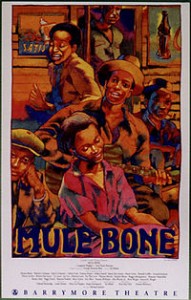
Despite his great affection for the Godmother Hughes was feeling controlled, beholden and with his creativity stifled their relationship deteriorated and not long after she cut him off. The financial and emotional toll stressed him into a psychosomatic illness. He returned to his mother’s home in Cleveland to recuperate. As fate would have it he discovered Hurston had copyrighted the play and was in the process of negotiating the rights with the Jelliffe’s of the Gilpin Players, the Black theater company long associated with Cleveland’s Karamu House.
Things blew up and Zora traveled to Cleveland supposedly to smooth things out admitting Langston was a co-author. But when she arrived at Langston’s home for a meeting with all the parties she discovered Louise Thompson was in town. A big blow out ensued with Zora acting out. In her crazy way she did an about face disavowed Langston’s authorship baffling the Jelliffes and disrespecting Langston mother who he had to physically restrain. He was also recovering from a tonsillectomy and barely able to talk.
The friendship never mended. Zora would later confess to Arna Bontemps how sorry she was for her behavior admitting her jealousy of Louise Thompson. A romantic entanglement is not hard to imagine. Hurston understandably was in love with Hughes. They were after all in their twenties and he was strikingly good looking. Zora didn’t mention Langston in her memoirs and he politely referenced her as Miss Hurston in his. The play would not be performed until 1991 on Broadway to negative reviews. Critics all in agreement expressed regret the play was never finished. To use Langston Hughes’ words: Girls are funny creatures.

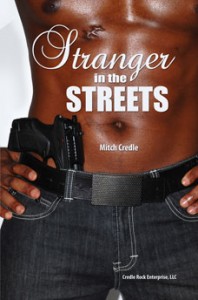 DC Homicide Detective Mitch Credle’s novel Strangers in the Street is one gritty real read, a journey into reality chocked with thugs, gangsters and rogue cops. From boys to men we follow Smokey and Black, a.k.a. Daniel Slade and Ricky Walker, one thoughtful and deliberative, the other impetuous and reckless. They bond as adolescents growing up in the rough section of Clifton Terrace spending their days hanging out, selling drugs, and committing street robberies. A crap game takes a turn for the worse and gunplay decides their future. Black takes a murder rap for Smokey and serves a juvenile life sentence. While Black is locked up until he’s twenty one, Smokey moves to the suburbs growing up in a relatively charmed existence. One becomes a hardened killer, the other a cop and years later their paths reunite and reignites their tender mutual affection. Theirs is a friendship illustrating how our past forever remains with us as constant as the loves of our lives.
DC Homicide Detective Mitch Credle’s novel Strangers in the Street is one gritty real read, a journey into reality chocked with thugs, gangsters and rogue cops. From boys to men we follow Smokey and Black, a.k.a. Daniel Slade and Ricky Walker, one thoughtful and deliberative, the other impetuous and reckless. They bond as adolescents growing up in the rough section of Clifton Terrace spending their days hanging out, selling drugs, and committing street robberies. A crap game takes a turn for the worse and gunplay decides their future. Black takes a murder rap for Smokey and serves a juvenile life sentence. While Black is locked up until he’s twenty one, Smokey moves to the suburbs growing up in a relatively charmed existence. One becomes a hardened killer, the other a cop and years later their paths reunite and reignites their tender mutual affection. Theirs is a friendship illustrating how our past forever remains with us as constant as the loves of our lives.

